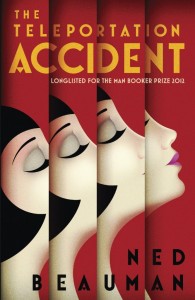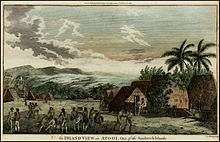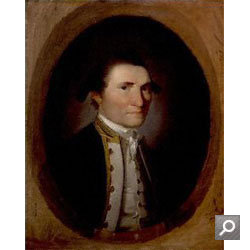Lucienne was born in Wolverhampton and now lives in Bristol, which is the inspiration and setting for much of her work. She completed an MA in English Literature (with Distinction) with the Open University in autumn 2006, specialising in eighteenth-century fiction. She is a member of the Historical Novel Society, having joined shortly after the HNS was founded fifteen years ago. She has written numerous articles, reviews and interviews for the HNS and was formerly editor of the Society’s fortnightly e-Newsletter. She is organiser of the Bristol and South West Region HNS group. She is also a member of the Women’s History Network, the Regional History Network and the Friends of the Women’s Library.
To The Fair Land, an eighteenth-century thriller about a fictitious voyage of discovery, was published in 2012. Described by the HNS as “A gripping, thrilling mystery” (and by one reader as “Dickens without the wordy parts”)
The Bristol Suffragettes (non-fiction) was published in 2013, a history of the suffragette campaign in Bristol and the south west which includes a fold-out map and walk. Lucienne has done numerous articles and talks about the suffragette campaign, and also shares information on her website – http://www.lucienneboyce.com/suffragettes/
Unsurprisingly, then, we’ll be talking about some of the challenges of writing historical fiction. Lucienne, I’m going to start with a quote from The Teleportation Accident by Ned Beauman.
“…I’ve never seen the point in historical drama. Or historical fiction for that matter. I once thought about writing a novel of that kind, but then I began to wonder, what possible patience could the public have for a young man arrogant enough to believe he has anything new to say about an epoch with which his only acquaintance is flipping listlessly through history books on train journeys?”
Before I ask for your reaction to that, it’s only fair to point out that Beauman has one of his characters speak the words, and all too soon it becomes plain that they are spoken precisely because his novel is historical fiction with a twist. He is giving himself licence to play with the theme. That said, one of the things Beauman achieves so effortlessly is that his characters are very modern, and are plagued by the same obsessions as us. The book is set while the Nazi party is growing but, rather than have the main character focus on the political uprising, Beauman has him wondering if he will ever have sex again, which provides an instant connection.
To some, the idea of writing any novel may seem like a fairly arrogant and self-indulgent idea to entertain. In an age when we are told that life expectancy will increase to 100, and fiction is classified as ‘historical’ if the setting is over thirty years ago, we can all expect to dabble with history in our characters’ back stories. Since we’ll find their motivation there, it can’t be ignored. My intention when writing I Stopped Time was to pay tribute to men and women (like my grandmother, who lived to the age of ninety-nine), who experienced an enormous period of change. It’s said that reading novels allows a person to live thousands of lives. The same can be said of authors. To explore a period of history through one character – or perhaps a small cast – brings history down to a very personal level, making it easier to digest. For me, reading non-fiction can be a passive experience, but when I am writing I am inside the story. Through my characters, I have to confront sights and sounds and react to them in the moment. In that sense, unless you are writing comedy, I don’t think it is possible to take historical fiction ‘lightly’. (I’m afraid to say that I found The Hundred Year Old Man Who Climbed Out of the Window, which was intended to be comedy, deeply offensive. Recent history is too raw and sensitive to be messed with.)
Lucienne: You mention that fiction is classified as historical if its setting is over 30 years ago. This is one interpretation of the knotty problem of “what is history?” and I’m sure readers and writers have their own opinions. It’s a question frequently debated in the Historical Novel Society, where we work to a cut off of fifty years (see http://historicalnovelsociety.org/guides/defining-the-genre/), as much for practical reasons as anything else – you’ve got to draw a line somewhere. Some people think if something happened in their own lifetime, it isn’t ‘historical’. Others think that if an event is somehow ‘big’ and ‘public’ it’s historical, which could include something that happened only weeks ago. So I think there are many different interpretations, and maybe different interpretations for different purposes. I tend to take a fairly flexible approach myself, and I agree with you that in practice we can all expect to approach history – however we define it – in our characters’ stories.
I haven’t read The Teleportation Accident, so it’s impossible for me to understand the context in which this comment was written. It did remind me of a young woman I met once who told me she didn’t read any fiction because she didn’t see the point in “made up bullshit”. There goes my life’s work!
I’m interested in history from the ground up. I don’t really have much interest in kings and queens. I have an interest in giving voice to the dispossessed and downtrodden. The story I’m working on at the moment, for instance, centres around the anti-enclosure movement of the 18th century. Certainly when I was at school (before the Flood) enclosures – and the industrial revolution generally – were presented as developments that were progressive, inevitable, and basically Good Things, and the people who resisted them were backward and stupid. Well, there are all kind of attitudes there that I don’t agree with and it’s becoming more and more important to me in my work to explore them.
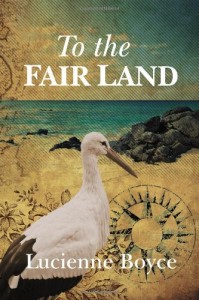
To buy click here
Jane: Which brings me onto your novel, To the Fair Land. The eighteenth century seems ripe for picking. In 1789 alone, the year in which it was set, there was The Regency Crisis (narrowly avoided by George III’s recovery), riots in France which led to revolution, revival of the Frost Fairs as particularly harsh winters caused the Thames to freeze, the discovery of two small coffins thought to be the Princes in the Tower, The Mutiny on the Bounty, First President of US sworn in, proposal to abolish slave trade, Food Riots…
Lucienne: I suppose the cliché is that the eighteenth century was the cradle of our own modern society – the industrial revolution, enclosures, exploration, medical and scientific developments and so on, all leading to changes in how people lived, dressed, ate, what they believed, what they knew, etc, etc. And for me it feels like an age in which the foundation of so many of the things that are wrong with us today were laid – industrialisation, pollution, consumerism…
But all that serious gloomy stuff aside, it’s just so exciting. Imagine what it must have been like to live in a world where so much had yet to be discovered, so much to aim for, so much to fight for, so much to seize – which is why in To The Fair Land the theme of colonisation is important – that Europeans will pillage and destroy the Fair Land. So you’ve got conflicting motives: discovery for the sake of knowledge, and discovery for the sake of gain.
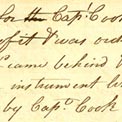 It’s an age of clashing ideas: faith and reason, science and religion, brutality and gentility, myth and reality (whatever that is…), male and female, Empire and national autonomy. An age when men could still believe in mermaids, and scientifically measure the transit of Venus; an age when if you needed medical treatment you were as likely to be told to drink the Bath waters as undergo clinical surgery. So much tension! So much conflict!
It’s an age of clashing ideas: faith and reason, science and religion, brutality and gentility, myth and reality (whatever that is…), male and female, Empire and national autonomy. An age when men could still believe in mermaids, and scientifically measure the transit of Venus; an age when if you needed medical treatment you were as likely to be told to drink the Bath waters as undergo clinical surgery. So much tension! So much conflict!
It was a great age for women’s literature and feminism. My heroes come from this, the age of the mothers of the novel: Mary Wollstonecraft, Charlotte Smith, Frances Burney… it’s a roll call of fabulous and wonderful thinkers and writers. The bluestockings! Wonderful women. You won’t be surprised to learn that when I did my MA in English Literature with the OU I specialised in eighteenth-century literature. I loved that course. In the 1980s/90s Pandora Press published a series called “Mothers of the Novel”, which were reprints of many of these and other women’s novels from the eighteenth century. A treasure trove.
Jane: Of course, at a time when there is talk of a new publishing revolution, you’re writing about an author in era when there was a similar revolution taking place. I’m thinking of Lane, who established Minerva Press in 1784 and, within a decade, was producing 30% of all novels published in London. The son of a poulterer, he began by selling books from his father’s shop – bookselling as an incidental activity! Lane arranged for would-be booksellers to receive a small library of his publications, together with a catalogue and instructions on how to operate. It was effectively a library service – although no one used that term – and Lane was in complete control. As happens now, this shows how a very few were deciding what the general populace should read.
Lucienne: Yes, I suppose it was ever thus, though the reading part of the ‘general populace’ was much smaller. Actually, one thing that amuses me today is to see the revival of eighteenth-century publishing models like subscription funding – now we call it crowd funding. Self-publishing was with us then too, though arguably not as accessible/affordable as it is today. On the other hand, it was quite common practice for people to circulate work in manuscript form and that didn’t cost much.
Jane: Can I ask, how do you go about researching the main themes in To the Fair Land? (I wondered if you had read the Kit Cat Club?)
I haven’t read the Kit Kat Club, which so far as I can tell goes up to the reign of George 1 so is a bit early for me. Samuel Johnson said, “a man will turn over half a library to make a book”, and I’d have to agree. I read history books, diaries, letters, autobiographies, novels, contemporary literature including novels, poetry, magazines and newspapers, pamphlets, sermons, drama and so on. For To The Fair Land in particular, voyage narratives were very important. The diaries of people who were on Cook’s voyages were a vital source – the journals of Cook himself, Joseph Banks, Johann Forster and others, as well as accounts of journeys undertaken by other eighteenth-century sailors.
One source that’s very important to me is art, including portraiture, landscape and cartoons. You get all sorts of details from them: what people wore and what their interior and exterior surroundings were like, their accessories and everyday items in use…I love the work of Hogarth (though he’s a bit early for To The Fair Land), portraitist Thomas Lawrence (who will be making an appearance in a future story), Turner… and for To The Fair Land I looked at the work of artists who were on Cook’s voyages, amongst them Sydney Parkinson and William Hodges. Both were fabulous artists. Bristol Art Gallery and Museum has lots of work depicting Bristol’s maritime history.
I also listen to music – not just classical but folk music – sea shanties, protest songs – the things my characters might have been familiar with. One of my favourite songs is Over the Hills and Far Away. I just loved John Tams’s rendition in the Sharpe TV series. I refer to the song in To The Fair Land.
Place is very important to me. I visit as many locations with an eighteenth-century connection as possible. I’m lucky in that much of Bristol’s eighteenth-century heritage still remains, and of course I live very close to Bath. Museums, art galleries, houses, parks and gardens – they all play a part in my research. The National Maritime Museum of course was a great resource.
I’m a great believer in walking in my characters’ footsteps whenever possible. Even though so many things have changed I still get a real sense of connection with them and a feeling for what they might have seen, smelt and heard. Since part of the novel is set in Bristol, that wasn’t very difficult to do. I was very lucky when the replica of Cook’s ship The Endeavour visited Bristol a few years ago and I was able to go aboard her and get some sense of what being on a ship was like.
 I also see as much eighteenth-century drama as I can. Bristol Old Vic did a production of a play by Frances Burney a few years ago – A Busy Day – which was for me an absolute must not miss, and I’ve seen some great productions of She Stoops to Conquer, The Recruiting Officer and so on. The line between research and enjoyment is very thin!
I also see as much eighteenth-century drama as I can. Bristol Old Vic did a production of a play by Frances Burney a few years ago – A Busy Day – which was for me an absolute must not miss, and I’ve seen some great productions of She Stoops to Conquer, The Recruiting Officer and so on. The line between research and enjoyment is very thin!
I often watch films set in the period, though I don’t usually expect much in the way of accuracy – but I enjoyed Alan Bennett’s The Madness of King George. Films like The Duchess are alright for looking at pretty dresses and gorgeous sets. I watch documentaries sometimes, but I often find them quite boring; the trend these days seems to be to repeat everything several times and use an hour to convey quite a small amount of information, but like films they are of course good visual sources.
Jane: When I was discussing historical fiction with Evie Woolmore, she said that there are three kinds of ‘historical novelists’: those who write in order to accurately reconstruct history in fictional or quasi fictional terms (Philippa Gregory or Hilary Mantel); those who write stories whose plot is reliant on and infused with the historical setting and thus which are historically very precise and well-researched (such as Harriet Steel’s novel Salvation, which I recently reviewed); and those (like me) who write novels which are not principally historical but work effectively in historical settings. Do you share that view and, if so, which category do you fall into?
Lucienne: I certainly agree that not all historical novelists are trying to achieve the same thing, which is why I get a bit fed up with people who want to lay down rules for writing historical fiction, especially rigid standards of ‘accuracy’. I suppose the closest I come to any of these definitions is the middle one. I do research my work very carefully but at the same time I’m not interested in the detail for its own sake, so the ‘accurate reconstruction’ definition doesn’t really describe me, and I am sceptical about the notion of accuracy anyway. Some readers love long passages telling them how gloves were made or describing costume in great detail – usually upper-class women’s costumes – or describing every little detail of a setting, but I’m not one of them. I prefer the well-chosen detail that conveys something about the story or the characters.
And if writers want to play around with history – write alternative history for example, or time travel, or deliberately use anachronisms, or mash it up with fantasy – then I’m all for it. In fact, I love historical fantasy – George R R Martin’s Game of Thrones of course (the Wars of the Roses), and Guy Gavriel Kay’s work such as the Sarantine Mosaic books which are based on Byzantium, or A Song for Arbonne based on Provence’s troubadour culture. He’s such a brilliant writer. Incidentally, I’m doing an event at Foyles in Bristol on 12 November 2014 when I’ll be discussing historical fantasy with Helen Hollick, Jack Wolf and Juliet McKenna. (Look out for details on my website soon http://www.lucienneboyce.com/diary.html )
Jane: One of the interesting things about writing historical fiction is that the reader has the benefit of hindsight, while the characters in the book do not. How do you use this to your advantage in To the Fair Land?
Lucienne: Yes, it’s amazing how many characters in historical fiction are so very well informed and politically aware. However, a lot of writers exploit the narrowness of an individual’s vision to good effect – Bernard Cornwell in his Sharpe novels for example can describe battles from the point of view of Sharpe, exploiting the fact that everyone’s experience of a battlefield will be very different, depending on who, what and where he or she was. I was very conscious in To The Fair Land of wanting to write a story that focused on a particular element of history – the voyage of discovery – and I didn’t feel a need to tick all the boxes about what else was going on. So, the French Revolution is there as part of the background but Ben Dearlove, the main character, hasn’t got any particular connection to it. Presumably most readers will know something of the Revolution’s significance. But books that have to squeeze in and “fact check” all the history seem a bit odd to me. I’m more interested in themes.
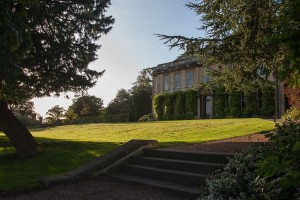

Goldney Hall, Bristol which is where Lucienne held the book launch for To The Fair Land and which also gets a mention in the novel!
Jane: Did the fact that opportunities for women were so limited influence your decision to write mainly from a male perspective?
Lucienne: Yes, partly. Mainly, though, it was also part of the point of the thing. To The Fair Land is about a woman who has been somewhere women weren’t supposed to go and done things women weren’t supposed to do, and finding out about her from a male perspective was, I thought, a way of showing up the attitudes that tried to keep women in their place.
Jane: I must say that I particularly enjoyed your line, “No woman ever launched a volume on the world without apologising for it first.”
Lucienne: Ben is no ‘right on’ male. He’s limited by his own conventions, and this limitation is one of the things that makes it hard for him to get to the truth. So it’s about thinking about how both men and women are limited by gender stereotypes. The issue of female writers’ anonymity and gender disguise is one that interests me. I wrote a blog about it a while ago, in which I drew parallels with the contemporary situation – The Female Writer’s Apology, or Then and Now. It’s here if you’re interested in reading more about it.
Jane: The key trick in writing historical fiction is transporting readers to another time and place without overloading them with historical information. So how much detail is too much?
Lucienne: I think all writers have to find their own balance. It also depends on what you’re trying to achieve, and what expectations you give your reader. So if your readers are the kind who like a lot of detail, that’s what you’ll include; or conversely if you like writing a lot of detail those are the kind of readers you can expect to attract. I think the main thing is to be aware of what you are trying to do, and don’t cheat the reader into thinking they’re going to get one type of book when you’re offering another. I’m not one of those historical fiction writers who wants to use fiction to teach people history, for example, so I don’t have the same attitudes to historical detail and accuracy that someone for whom that was a priority might. Not all books have the same purpose, and so there isn’t a ‘one size fits all’ rule.
That said, I think many readers – myself included – dislike ‘information dumps’ – where the writer has done the research and found it so exciting that they’re damned well going to put it in even if it has no connection with the plot, tells us nothing about the characters, and doesn’t advance the themes.
Jane: An early editorial review of I Stopped Time criticised the apparent ease with which my main character Lottie deserted her young son. ‘Part of the problem, I know, is different mindsets. Today, we feel that a mother should always put her child above a husband or partner. A hundred years ago, children were seen as being relatively less important, and society structures and viewpoints placed the woman’s role as being with her husband – this is reflected in the fact that Lottie feels excluded from the raising of her child. I’m not suggesting that you traduce historical truth, but the whole thing should be much more of a crisis in which we in the twenty-first century can feel Lottie’s terrible suffering.’ It is not that I don’t understand how a nineteenth or twentieth century mother might seem ‘cold’ by today’s standards, but I do feel that writers have a duty to provide an insight into how things were and to illustrate how rapidly attitudes have changed. I recently found a picture on a historical photographic board on Pinterest of a Brooklyn mother who had put three of her children up for sale during the 1930’s depression. Far from receiving criticism, she was applauded for her practical solution of how to feed the other five. No one felt the need to ask if her decision was heart-breaking. It had to be done. And presumably she had been forced to choose which of the eight to sell – the eldest, I’d imagine. How do you perceive the temptation to superimpose our own contemporary values on historical fiction?
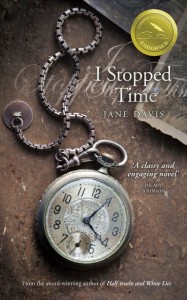 Lucienne: I don’t know if you can avoid the temptation, or even if it’s desirable. One of the things that excites me about history and historical fiction is how the present meets and interacts with the past. So if we read historical novels written by a Victorian writer – Dickens’s A Tale of Two Cities for example – we are going to get a very different approach, very different attitudes and ideologies, to the French Revolution than, say, Hilary Mantel’s A Place of Greater Safety. For me that’s part of the pleasure: how we interpret the past says a lot about who we are now.
Lucienne: I don’t know if you can avoid the temptation, or even if it’s desirable. One of the things that excites me about history and historical fiction is how the present meets and interacts with the past. So if we read historical novels written by a Victorian writer – Dickens’s A Tale of Two Cities for example – we are going to get a very different approach, very different attitudes and ideologies, to the French Revolution than, say, Hilary Mantel’s A Place of Greater Safety. For me that’s part of the pleasure: how we interpret the past says a lot about who we are now.
The question of ‘mindsets’ is a tricky one, isn’t it? You have to ask: just how different were they? For example, at one extreme is the view that because people lived in the past, their feelings and actions have little or nothing in common with us today. Take, for example, the viewpoint that in eras when child mortality was very high, parents didn’t mourn a child’s death: they took losing a child in their stride. If you read the poetry and prose of women from the seventeenth and eighteenth centuries who have lost children you will soon discover that this simply is not true. These women were heartbroken, just as mothers today are (well, most – aren’t there cruel and uncaring parents anymore?). And so were their husbands. So is there a difference of feeling, or is it that there’s a difference of how feelings were expressed or suppressed?
At the other extreme, consider the work of Suzannah Dunn. At a recent talk in Bristol, she said, “Values have changed, but I’m surprised by how feelings are all the same”. So in her books she has people living by what seem like very modern attitudes. Young Tudor women hop in and out of bed with their boyfriends without a thought for the risks they were running by defying a patriarchal society which sought to control women and even demonised their sexuality. It was a society that was quite prepared to use judicial violence (imprisonment, scold’s bridle, ducking stool, etc.) as well as other less tangible sanctions (eg, economic, familial) to enforce its anti-feminine ideologies. But it works within her books because they are a reflection of her vision of the past.
On the other hand, the plaintive cries that “no one could have done that then” are often based on a narrow view of history. I’m more and more astonished by how much people did do – take the old chestnut that “people didn’t travel much in the eighteenth century”. It’s simply not true. There were some very well-travelled people – and I’m not just thinking of Captain Cook or Joseph Banks. Society was much more mobile than the clichés would have you believe. The more you discover, the more you are surprised by stumbling on what we think are “modern” attitudes.
It’s an attitude that seems to me to reflect something of the arrogance of the present, the idea that the past only existed as a stepping stone to where we are now with our superior knowledge, our superior culture and society. Well, it isn’t all that superior – slavery hasn’t gone, child hunger hasn’t gone, homelessness hasn’t gone, cruelty to animals and war are still with us. Those things are modern and those things are history too. As for our much-vaunted knowledge, our precious modernity, I feel as much has been lost as has been gained. I remember the first time I read Hardy’s Under the Greenwood Tree and how struck I was by the writer’s knowledge of nature, the seasons…it is a whole swathe of knowledge that is lost to many of us today.
So in the end the questions for me are: just how different do I, the writer, think the mindsets were? How much does mindset contribute to an individual’s disposition – how does it affect character? And whose mindset – the lord and lady, or the ploughman and the maid? Do I even believe in the idea of ‘mindset’?
In the end I think it all comes down to our own interpretation of the history. But as with all things, it’s a balancing act. Too much crisis might have the effect of making a character who is intended to be strong seem weak. Perhaps the main thing is that whatever you’ve got your characters doing seems right for them in their time and place, i.e., the time and place you’ve created in your novel, based on your interpretation, your vision, of the history, of the character, their background and so on.
Jane: Verbal anachronisms have been spotted recently in Downton Abbey and in Ripper Street. There is always a difficulty of striking a balance between getting the ‘feel’ of the language of the era right and borrowing directly from the language of the day. How do you go about this?
Lucienne: I love Ripper Street, and I think it has a very interesting way with language. There’s a rhythm to it that makes it seem authentic, even if anachronisms have been spotted, which frankly wouldn’t bother me. In the end I think that all these things – language, setting, costume, atmosphere and so on – are literary devices intended to convey a sense of time and place. They are not the time and place; no novel could hope to convey the time and place as if these exist as discoverable, objective things (in fact, I’ve always been puzzled by the idea of any novel being ‘realistic’ – but that’s another whole debate!). We don’t know everything about history (on a very basic level, how can we when we only have the records, themselves subjective, that happen to have survived?), and what we do know is subject to interpretation. Take the Battle of Edgehill: who won? Well, the Royalists say they did and the Parliamentarians say they did and so modern historians have a lot of fun arguing either way. You could easily get two very different novels out of this single example alone, couldn’t you?
So for me the point is that the writer is trying to create an effect. Some writers use what they call ‘neutral’ language, which always intrigues me because I wonder if the neutral language of someone born in the 1950s is the same as that of someone born in the 1970s. That aside, that’s the aim: to create something that looks like neutral speech in order to create an effect. Other writers decide that if people were like us more than they weren’t, then they’ll reflect this by using openly modern speech. Some writers have tried to use very archaic language – what is known as ‘gadzookery’ – but I think it’s very difficult to pull off with any success. Bernard Cornwell, for instance, once said that he doesn’t have Sharpe and other military characters swear all that much, though probably in reality they would have sworn a great deal – but to the modern reader this could be very off-putting. One of the few writers who I think succeeded was William Morris, who is a great hero of mine. He used a sort of medieval language in his fantasy novels, and it’s beautiful and poetic, but it was never intended to be ‘authentic’. It works on its own level, it’s mythical and lyrical, and I just love it.
Some writers try to create something in between: speech that is intelligible to the modern reader but incorporates something of the pattern and language of the era in which the work is set. And that’s where I am, I think – I do like to incorporate eighteenth century words into my writing. One reason for that is quite simply that I love the language. So I enjoy throwing in the occasional phrase or word where I think it sounds right or achieves an effect I’m aiming for.
I try to make the meaning of such words intelligible from the context. It was the publishers of To The Fair Land who suggested that I should include a glossary as well. In the end though I was happy to do it. As a word lover, a collector of words, it was fun. When I was a child, I used to read books that were far beyond my understanding and fill notebooks with lists of words I didn’t understand. Then I’d look them up in a dictionary and write out definitions I often didn’t understand either! But I just loved the look and sound of the words. So glossing was a childish pleasure.
One thing I do try to do is to avoid words that are anachronistic, so I usually have the Oxford English Dictionary open when I’m writing or editing and when a word jumps out at me as not feeling quite right I check it. If I find it was coined in the nineteenth century or later, I look for another word that would have been in use in the eighteenth to replace it. I’m not promising I pick up every word, but I do get a lot of satisfaction out of trying to stick to words that would have been known to my characters. In the end, though, if the odd word slips through I don’t lose any sleep over it. It is only a device, not a rigid rule.
Jane: I find in my fiction that nostalgia is a very powerful force to draw on. Historical fiction is a tool by which we can measure the speed of change. I never fail to read fiction set the Victorian and Edwardian eras without thanking my lucky stars that I was born in the 1960s, post-war, with equality on the agenda and a right to vote. In his recent speech to graduating university students, Tim Minchin mentioned that the current generation will have a life expectancy and riches that their grandparents and great-grandparents would never have dreamed of. As the popularity of the series Who Do You Think You Are? demonstrates, there is a resurgence of interest in genealogy and a feeling of loss for all of those true stories that were never shared between the generations, of lost opportunities.
Of course, the best historical fiction challenges readers – or, in the case of the recent televised drama, The Wipers Times, viewers’ perception – of what they thought they knew. The telling of a story through the eyes of one character, allowing the reader to live another life, makes it real. It brings history to life.
Lucienne: Nicely put. For me, too, historical fiction – all fiction – is a dialogue. Books are a big, exciting conversation. One writer puts forward a particular vision, another writer comes along with a different vision… It’s the play of ideas that matters, so the kind of writing I enjoy is writing that is prepared to enter that dialogue, to challenge and be challenged, not set itself up as the definitive version of something. Everything is in a state of flux, what we call reality has so many different facets, how dull it would be if we succeeded in nailing everything down! Which is why, as I say, I dislike dogmatic pronouncements about how historical fiction, or any fiction, should or shouldn’t be written. The main thing for me is that it has artistic integrity.
Now, if I may, I have a couple of questions for you!
Jane: Fire away!
 Lucienne: One of the many things that intrigued me about I Stopped Time was the use of split narrative and the interplay between a contemporary and ‘historic’ character. This was also reflected in Lottie’s great age, so that her history seemed to meet the present. I know I’ve mentioned Suzannah Dunn before, but her talk did raise a lot of interesting questions, and one of the things she discussed was her sense of the closeness of our ancestors to us. For example, if you consider the average life span to be around eighty-five, the Tudors are only five lifetimes removed from us. So she seems to feel a closeness to people of the past, and she remarked, “I try to say not ‘they used to do that’ but ‘we used to do that’ ”. What is your reaction to that comment?
Lucienne: One of the many things that intrigued me about I Stopped Time was the use of split narrative and the interplay between a contemporary and ‘historic’ character. This was also reflected in Lottie’s great age, so that her history seemed to meet the present. I know I’ve mentioned Suzannah Dunn before, but her talk did raise a lot of interesting questions, and one of the things she discussed was her sense of the closeness of our ancestors to us. For example, if you consider the average life span to be around eighty-five, the Tudors are only five lifetimes removed from us. So she seems to feel a closeness to people of the past, and she remarked, “I try to say not ‘they used to do that’ but ‘we used to do that’ ”. What is your reaction to that comment?
Jane: I like that point about the Tudors, and it’s something that I’m becoming more aware of as I grow older. When I was a child, the second world war seemed like ‘history’. Now I am shocked by how recent an event it was, particularly in the late sixties when I was born. My partner grew up in Liverpool and he was very much more aware of the recent history of his city, because there wasn’t the money to rebuild. In fact, much of the rubble was still lying round in the streets. And at a recent family gathering to celebrate my parents’ fiftieth wedding anniversary, the uncles and aunts were sharing their evacuation stories, the majority of which I’d never heard before, and yet these were the events that shaped them. But can I – or should I – say ‘we’ when I’m talking about something I have no direct experience of? Taking one aunt as an example, she was evacuated from her family home and had to start again, and four years later she was uprooted again and had to go back home. Except that the home she left was not the home she returned to. In the four years of her absence, her father had remarried – a stranger – and two new half-sisters (one of them my mother) had taken over her bedroom. There was not only no space for her: there was no place for her. She had to sleep under the Anderson shelter. And she was expected to take that all in her stride. So can I say ‘we’? No, of course I can’t.
Lucienne: I was also intrigued by the theme of developing technologies and how Lottie is at the forefront of things which by the time of the second narrator have become an everyday part of our world (in the developed world at least) – cars and photography. Both these technologies have had profound implications for our world, some of them negative – pollution from cars, the use of the camera as an instrument of surveillance. So I wondered if you could say something about your foreshadowing of these developments. Why did you choose these technologies in particular? What resonance do they have for you?
Jane: I can’t say that I went as far as foreshadowing negative developments. Like you, I also use images as part of my research, except that with recent history, the images are mainly photographic. I do not have the analyse them and ask myself if the artist intended the picture to be taken literally or if use had been made of symbolism. Photography is a passion of mine and, for the book, I chose to focus on just three photographers: Frank Hurley, Lee Miller and Lartique. Of these three, it is Lartique’s body of work that catalogues the century best. A weak child coming from a wealthy French family of eccentrics, he was always someone who was going to observe rather than participate, and so he was given a camera. This was something no other eight-year-old would have had access to, but he didn’t take the responsibility lightly. He understood what he was holding in his hands, and he made meticulous notes of every experimental shot he took, and he mastered the equipment – in fact, many photographers today say that they don’t know he managed to achieve what he did. It may have been that it was the fact that he was a child, but he was able to record the precise moment in time, charged with all of its happiness or emotion, with all of its movement, before it was erased.
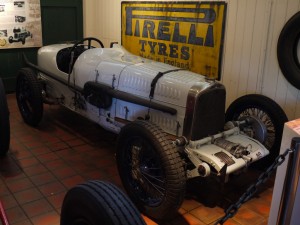 Some of his pictures of children at play – skipping rope or throwing a ball – are so infused with energy. As a ten-year-old he used to sit at the same spot on the same street and photograph the fashionable Parisians as they took their daily walks. Because of his unique position, he photographed the construction of some of the first experimental ‘flying machines’, the first flights, the first motor cars, the first world war. His photographs have none of the stiffness of formal studio shots. because photography emerged when it did, there were many women pioneers, and of course Lottie was one of them. For an idea of how her career might have developed, I read the extraordinary biographies of Lee Miller, model turned photographer turned photo-journalist.
Some of his pictures of children at play – skipping rope or throwing a ball – are so infused with energy. As a ten-year-old he used to sit at the same spot on the same street and photograph the fashionable Parisians as they took their daily walks. Because of his unique position, he photographed the construction of some of the first experimental ‘flying machines’, the first flights, the first motor cars, the first world war. His photographs have none of the stiffness of formal studio shots. because photography emerged when it did, there were many women pioneers, and of course Lottie was one of them. For an idea of how her career might have developed, I read the extraordinary biographies of Lee Miller, model turned photographer turned photo-journalist.
As for motor cars, one of the changes I have seen in my own lifetime is the transition from the car being seen as a luxury item to being viewed as a necessity. When I was a child we walked everywhere. (There weren’t many cars that would accomodate five children and two adults.) My partner is obsessed with motor racing, so I suppose the decision to make Sir James’s father a racing driver is a sign of his influence. We also have fantastic resource near us in Brooklands Motor Museum, which was invaluable in carrying out research. There is nothing like being able to go ‘shopping’ for the vehicles you are going to have your characters drive.
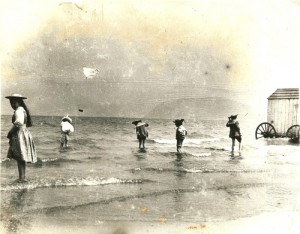 Lucienne: I particularly liked Lottie’s relationship with the sea, and her need to be near it. When I was researching To The Fair Land I got very interested in the idea of liminal settings, especially in relation to sailors on long voyages who deserted, who did what some people called ‘going native’, and settled in a place that was literally and figuratively on the edge of society: they lived on the beach, and they dropped out of their own society but weren’t part of the ‘native’ society either, so they were between sea and land, and between two cultures. Lottie is also between two cultures, i.e., when she moves to London and mixes in upper-class circles. So, I wondered, what kind of ideas informed Lottie’s passion for being near the sea?
Lucienne: I particularly liked Lottie’s relationship with the sea, and her need to be near it. When I was researching To The Fair Land I got very interested in the idea of liminal settings, especially in relation to sailors on long voyages who deserted, who did what some people called ‘going native’, and settled in a place that was literally and figuratively on the edge of society: they lived on the beach, and they dropped out of their own society but weren’t part of the ‘native’ society either, so they were between sea and land, and between two cultures. Lottie is also between two cultures, i.e., when she moves to London and mixes in upper-class circles. So, I wondered, what kind of ideas informed Lottie’s passion for being near the sea?
Jane: Interestingly, I have just returned from a week’s walking on the Pembrokeshire Coastal Path. It is amazing how quickly the body adapts to the broad horizons, the sense of freedom. I remember reading that Hilary Mantel had decided to relocate to the coast so that she could breathe in time with the tide, and that is true too. There is something very alluring about water. Just watching the ebb and flow is hypnotic. I arrived back in London – in the Friday afternoon rush hour – by train, and the sense of claustrophobia I experienced was intense. The taste of diesel in the air. Being crammed into a train carriage, forced up against people I didn’t know; forced to listen to their noise.
For Lottie, a working class girl from Brighton, the idea of London, the glamour of it, was the dream. I imagine that if you had lived with the sea all of your life, that sense of seeing walls everywhere you look would be amplified.
In fact, I set the book in Brighton for practical reasons. It was where my research led me. Some of the very first photographic studios were based there. I don’t tend to fight facts. But, of course, once you have decided on a setting, you have to imagine what impact growing up in the place would have had on a child, and I did have this wonderful opportunity to play with the contrasts between war-torn London and the coast. The book begins at a time when the streets were a child’s playground and children not only had freedoms that were unimaginable by today’s standards – parents told them to make themselves scarce. And I liked the idea that the sea would have a hold on you; that it wouldn’t let you go. Symmetry within story-telling is very important to me.
To find out more about Lucienne:
Website: http://www.lucienneboyce.com/
Twitter: @LucienneWrite
Facebook: https://www.facebook.com/lucienne.boyce
Blog: http://francesca-scriblerus.blogspot.co.uk/
Newsletter: http://www.lucienneboyce.com/newsletter/
If you enjoyed this post, you might like to visit the sidebar and subscribe to my blog
Alternatively, if you’d like to, please join in the discussion…
Author Ali Bacon submitted the following comments in response to this post:
What a great discussion. A few weeks ago I spent an evening at a historical fiction ‘masterclass’ in which the whole past/present issue was raised and the point was made that the interest of HF is in portraying a time that is in many ways alien to our own while drawing on the universality of human experience (yes, I have paraphrased!) I tend to agree with Lucienne that we can only see historical characters through the prism (I may have borrowed that word from Jean Burnett) of our own mindset so that the author must at least acknowledge this if the characters are to ring true, although I think this would still allow them to act in a way appropriate to the period. I’m still mulling over how this applies to Lottie. I don’t think I held it against her that she deserted James as I could see her predicament, and her sense of loss is of course reflected in her actions at the end of her life. But thinking about it, more obvious heartache on her side might have strengthened rather than weakened the novel for me (not that it’s a novel that exactly needs shoring up!)
There was also discussion in the masterclass of authenticity vis a vis accuracy, in the sense that something may be historically accurate but if the reader thinks otherwise it will not come across as authentic. But to know what’s accurate and not represent it? Now that is a tricky one to call. Maybe again it’s a case of somehow acknowledging what’s assumed before subverting or dispensing with it.
I certainly agree that historical fiction can be done in different ways and to a different purpose. In my case I stumbled upon a story I felt would make a great novel i.e. the themes were what interested me. But it is a story that’s absolutely rooted in its time and place. So here I am, writing historical fiction, something I never actually intended to do. Luckily there are lots of people I can learn from 🙂 Thanks again.


